Why PM Modi refrained from naming Pakistan at UNGA
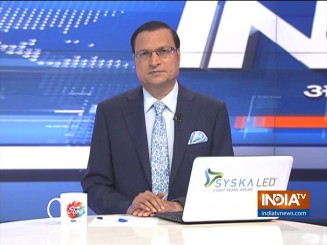 It was a study in contrasts when Prime Minister Narendra Modi spoke at the United Nations General Assembly on Friday, and an hour later Pakistan PM Imran Khan spoke from the same podium.
It was a study in contrasts when Prime Minister Narendra Modi spoke at the United Nations General Assembly on Friday, and an hour later Pakistan PM Imran Khan spoke from the same podium.
Modi’s speech in Hindi was measured, and it outlined the vision of his government. The Prime Minister spoke like a true statesman, a world leader with clear views on world peace and global climate change. His speech outlined India’s intention of leading the world on several global issues including climate change and terrorism.
Modi spoke about India’s thousand-years-old civilization and said, India never initiated war (Yudh) in its long history, it gave the world Buddha, the apostle of peace and non-violence. The Prime Minister appealed to the world comity of nations to unite in the fight against the evil of terrorism. He also appealed to the world powers to join hands in tackling climate change and eradicating poverty.
While doing so, Modi outlined the achievements of his government in the fields of social welfare, like Swachh Bharat, LPG connections to poor families, digital identification for all, inclusive banking for all, ban on single use plastic, solar alliance and free medical care.
Narendra Modi did the right thing in avoiding any mention of Kashmir and Pakistan. Kashmir is naturally our internal matter, and at most, it may be a bilateral issue. By not naming Pakistan, Modi gave a clear message: India has the potential to deal with Pakistan on its own. There is no need for third party mediation nor is there any necessity of raising this at an international forum.
Even as Indians outside the UN headquarters were expressing joy over Modi’s speech, Pakistan prime minister Imran Khan, appearing dejected, began his rambling speech that went on for 48 minutes. Imran Khan was supposed to speak for 15 minutes, but he went on an on, speaking about Islamic terrorism. Modi, Kashmir and nuclear warfare, and the red light blinked continuously for 33 minutes.
There was nothing new in Imran’s speech. People, particularly world leaders, have already heard him saying this over and over again, and there was nothing new. Imran Khan had already said a day ago that he was disappointed with the international community on Kashmir issue.
During his long speech, Imran’s gestures, body language and choice of words clearly showed that he was disappointed. The overall image of Pakistan as a nation surely has taken a beating, because its Prime Minister was speaking as if he was addressing a public rally in Pakistan. This was an international forum where world leaders are expected to present their vision about their country and the world, but the Pakistani Prime Minister launched into a tirade against Modi, RSS and India.
Imagine what the people of Pakistan must be thinking, when they saw their Prime Minister failing to present his vision of progress for his own country. I want to say this again, Imran will have a lot to answer for, when he returns to Pakistan.
Click Here to Watch Full Video | Get connected on Twitter, Instagram & Facebook
Pakistan’s soft attitude towards terror leaders exposed
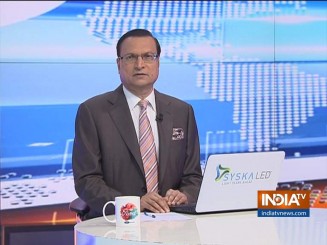 Pakistan has requested the United Nations Security Council committee to allow terror outfits Lashkar-e-Toiba and Jamaat-ud-Dawa chief Hafiz Saeed to withdraw a limited amount of money (Rs 1.5 lakh) from his bank account for “necessary basic living expenses”.
Pakistan has requested the United Nations Security Council committee to allow terror outfits Lashkar-e-Toiba and Jamaat-ud-Dawa chief Hafiz Saeed to withdraw a limited amount of money (Rs 1.5 lakh) from his bank account for “necessary basic living expenses”.
The request has been formally accepted by the UNSC committee as part of an automatic process, since the Pakistani government has supported release of funds to a sanctioned individual for “basic expenses”.
Jamaat-ud-Dawa was designated by the United Nations as a terrorist organisation in December, 2008 after the 26/11 Mumbai attacks in which 166 people were killed by terrorists trained and sent by Pakistan. Hafiz Saeed’s bank account was blocked by the Pakistan government in compliance with the UNSC resolution 1267 and the funds of JuD and other related organisations were frozen.
The Pakistan government has now sought release of Rs 1.5 lakh from these frozen funds to cover “necessary basic living expenses for Saeed and his family”. Saeed was a professor before he started his nefarious terror activities, and his monthly pension is being deposited into his bank account by the Pakistan government.
The soft attitude shown towards the Lashkar terror mastermind by the Pakistani government clearly exposes the hollowness of its claims of combating terrorism. It is because of Pakistan’s open support to terror outfits like Lashkar and Jaish-e-Mohammad that Indian External Affairs Minister S. Jaishankar has ruled out any talks with what he called ‘Terroristan’.
Jaishankar is right. How can India start dialogue with a neighbouring country which sends terrorists from across the border, stages attacks on its army bases, spills the blood of innocent people and then extends its hand of friendship?
Prime Minister Narendra Modi has clearly exposed on the world arena, the sheer hypocrisy of Pakistan’s stand on terrorism. Almost the entire world is now unwilling to trust Pakistan on the issue of combating terrorism, because it was in Abottabad, Pakistan, that the Al Qaeda chief Osama bin Laden was found hiding and scores of terror outfits are being nurtured in what is known as the “cradle of jihadi terrorism”.
Pakistan Prime Minister Imran Khan may plead innocence on the world stage, but none of the Big Powers are willing to listen to him. Time has come for the Pakistani army and establishment to seriously introspect and root out terrorism from its soil.
Click Here to Watch Full Video | Get connected on Twitter, Instagram & Facebook
Why Imran Khan said he is ‘disappointed’
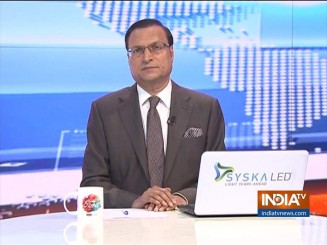 Pakistan Prime Minister Imran Khan hurriedly called a press conference in New York on Tuesday night after the meeting between US President Donald Trump and Indian Prime Minister Narendra Modi. A dejected looking Imran Khan said: “To be absolutely frank, I am a bit disappointed by the international community (over Kashmir).”
Pakistan Prime Minister Imran Khan hurriedly called a press conference in New York on Tuesday night after the meeting between US President Donald Trump and Indian Prime Minister Narendra Modi. A dejected looking Imran Khan said: “To be absolutely frank, I am a bit disappointed by the international community (over Kashmir).”
The Pakistani PM added: “The reaction would have been different and more urgent had it been eight million Europeans or the Jewish people or Americans…There is no pressure on Narendra Modi to lift the siege.”
Clearly, Imran Khan and the Pakistani army have lost the diplomatic battle over Kashmir. They tried their utmost to internationalize the issue of revocation of Article 370, which was clearly a domestic matter for India.
I think Imran Khan is neither worried over Prime Minister Modi’s diplomatic victory nor he is concerned about Kashmir. Before emplaning for New York, Imran Khan had promised the Pakistani people that he would create a storm in the international arena over Kashmir, but now that he will return with empty hands, he has much to answer for before his countrymen.
Judging by the ferocious attacks that are being launched by the opposition parties against Imran Khan over his “failure” over Kashmir diplomacy, and watching the tone and tenor of TV news channel debates in Pakistan, many uncomfortable questions are being asked. Clearly, Imran Khan looks worried and it appears that he is fighting a losing battle.
Time has come for Imran Khan and the army establishment to realize that no big power in the world, except China, wants to help Pakistan because of its dubious reputation as the cradle of Islamic jihadi terrorism. Our External Affairs Minister summed it up succinctly in a single sentence: “there can be no talks with Terroristan”. The sooner the Pakistani army understands the import of this statement, the better.
Click Here to Watch Full Video | Get connected on Twitter, Instagram & Facebook
Trump gives a sound rebuff to Pakistan on Kashmir
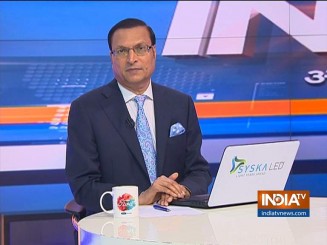 US President Donald Trump, speaking to the media with Prime Minister Narendra Modi in New York on Tuesday, clearly endorsed the Indian PM’s handling of Kashmir issue.
US President Donald Trump, speaking to the media with Prime Minister Narendra Modi in New York on Tuesday, clearly endorsed the Indian PM’s handling of Kashmir issue.
When a reporter asked what message he wanted to give Pakistan considering its Prime Minister Imran Khan had admitted in a gathering in US that Pakistan’s army and ISI had trained Al-Qaeda and other terror outfits, President Trump replied: “The message is not for me to give..it is for Prime Minister Modi to give, and I think he gave that loud and clear the other day….He gave a pretty loud message and I am sure he will be able to handle that situation.”
On Imran Khan’s remark, Trump said he had not heard his remarks but added that “I know this, that your Prime Minister will take care of it. You have a great Prime Minister, he will solve the problem. I have no doubt about it.”
On state sponsorship of terrorism by Pakistan, Trump said: “You mentioned Pakistan but Iran would have to be at the top of the list..It will be great if they (India and Pakistan) could work out something on Kashmir, we all want to see that… I believe Prime Minister Modi and Khan will get along when they get to know each other and I think a lot of good things will come from that meeting.”
Indian officials in New York say, Prime Minister Modi had conveyed to Trump that he was not averse to talks with Imran Khan, but Pakistan would first have to take concrete steps against terror.
The remarks by the US president are being seen as a devastating blow to the Pakistani establishment, which had been on diplomatic overdrive for the past several weeks trying to seek US mediation and international support on the Kashmir issue.
On the other hand, Trump effusively praised Prime Minister Modi by describing him as the “father of India”. He said: “I remember India before, not intimately, but I remember India before. It was very torn, there was a lot of dissension and a lot of fighting and he brought it all together. Like a father would bring it together, and maybe he is the father of India. We will call him the father of India..”
On the Houston event, Trump compared Modi with singer Elvis Presley. “There was tremendous spirit in that room too and they love this gentleman to my right..Those people went crazy, that was like Elvis..it was like, Elvis Presley came back.”
Clearly Trump has given out the message that so long as India does not want, he would not mediate on the Kashmir issue. India, on its part, is firm in its stand that Jammu & Kashmir has always been an integral part of India. Until and unless Pakistan stops aiding and abetting terrorists, there is no point in holding bilateral talks with a country that has always reneged on its commitments in the last 72 years.
Moreover, there is no point comparing Imran Khan with Narendra Modi. The Indian prime minister has rightly emerged as one of the world’s top and powerful leaders, whereas Imran Khan has now to think what to tell his countrymen when he returns to Pakistan empty handed.
Click Here to Watch Full Video | Get connected on Twitter, Instagram & Facebook
Modi has now brought India-US relationship on an even keel
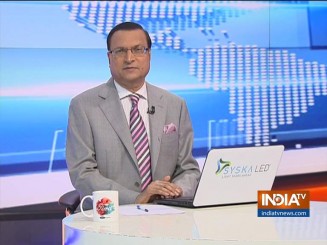 In a historic, landmark event at NRG stadium in Houston on Sunday, Prime Minister Narendra Modi and US President Donald Trump took a sort of victory lap, hand in hand, accepting accolades from the rapturous Indian-American crowd. Earlier, both the statesmen had lavished fulsome praise on each other, and Modi did some plain speaking about Pakistan’s terrorism export, with Trump sitting in the front row.
In a historic, landmark event at NRG stadium in Houston on Sunday, Prime Minister Narendra Modi and US President Donald Trump took a sort of victory lap, hand in hand, accepting accolades from the rapturous Indian-American crowd. Earlier, both the statesmen had lavished fulsome praise on each other, and Modi did some plain speaking about Pakistan’s terrorism export, with Trump sitting in the front row.
For me, this was a new history in the making which only a man like Modi could have carried through. Indians and Americans had never seen their leaders holding hands, making an entry on stage, praising each other and then doing a victory lap in front of a 50,000-strong audience.
Never before had a US president been a guest of the Indian prime minister on American soil. Never had an Indian prime minister said on American soil that he was introducing the US president to “my family”. Most of these Indian Americans are potential voters for Trump in next year’s crucial presidential elections.
For the first time, a US president, holding hands with the Indian prime minister inside a stadium, could have felt that his stature would rise and this would work to his advantage.
Till now, we, in India, had always been seeing India standing as a younger brother with the US, but Sunday night images were different. Both the statesmen stood as equal partners on stage, beaming with pride. Narendra Modi has truly raised India’s stature in the comity of nations.
The images of Houston event are endearing. Right from the grand welcome given to Modi, with spectators chanting ‘Modi, Modi’ and US Senators, House representatives, and other American leaders standing as the Indian PM took the stage till the final victory lap.
It was Modi’s idea to hold Trump’s hand and do a sort of victory lap around the stadium greeting the rapturous crowd. Clearly, Modi was the star of the show, and yet, as a graceful host, he also made Trump the star of his show – both through his speeches and action.
There was another image which was eye-catching. As Modi and Trump strode towards the stage from the ramp, with dance performers standing in a line, a nine-year-old boy from Karnataka, Satwik Hegde, who had taken part in the yoga exercise, suddenly took out his cellphone and requested the leaders for a selfie. Modi noticed the boy, and willingly posed with him and Trump for a selfie.
Atmospherics apart, Modi in his speech clearly outlined the success that his government has achieved in Swachh Bharat, Ujjwala mission providing LPG to poor families, Ayushman Bharat and several other big schemes. Modi spoke about the target of a 5-trillion-dollar economy for India, and said he was confident that the US economy would be a major part in our endeavor.
Let me delve into the past. In 1990, Narendra Modi stood as a tourist outside the White House, and 29 years later, the US president was assuring him that he was India’s closest friend in the White House.
In 2006, Geroge W. Bush was the US president and the US refused to grant a visa to Narendra Modi, but 13 years later it was Modi who is campaigning for the US president saying ‘Ab Ki Baar, Trump Sarkar’.
In 2012, 65 lawmakers from India had written a joint memorandum to the US president asking him not to grant visa to Modi, and seven years later, more than 60 US House representatives and senators stood in line to shake hands with Modi, and some of them took selfies with him.
We have had many prime ministers in the past. They used to visit the US. Several of them struck good personal rapport with past US presidents, but these were relationships in which a superpower was dealing with a developing nation. In those days, it was a big thing when the US president gave time to our prime minister in the White House.
Narendra Modi has completely upturned the entire format. He has brought the India-US relationship on an even keel. The Indian prime minister was not seen as seeking something, but was being seen as giving something to the US president.
I see this as the beginning of an equal relationship – a relationship about which India can be proud of. In the coming days and weeks, we shall be hearing more about the outcomes of this equal relationship.
Click Here to Watch Full Video | Get connected on Twitter, Instagram & Facebook
A bold and historic move by Finance Minister Sitharaman
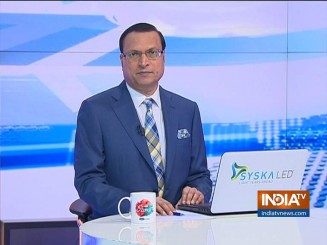 In a bold economic measure, Finance Minister Nirmala Sitharaman on Friday announced a reduction in corporate tax rate for domestic manufacturing companies from 30 per cent to 22 pc. This was aimed at giving a boost to Make In India initiatives. For new manufacturing companies, the corporate tax has been reduced from 25 per cent to 15 pc.
In a bold economic measure, Finance Minister Nirmala Sitharaman on Friday announced a reduction in corporate tax rate for domestic manufacturing companies from 30 per cent to 22 pc. This was aimed at giving a boost to Make In India initiatives. For new manufacturing companies, the corporate tax has been reduced from 25 per cent to 15 pc.
The fiscal changes will be brought through ordinance. The measure was timely because the GDP growth rate had slipped to 5 per cent this time, a six-year low.
This was the third time in last three weeks that Finance Minister Nirmala Sitharaman has made announcements to give a boost to business and economy. The announcement was in a sense historic.
The Bombay Stock Exchange sensex recorded its highest jump of nearly 2,000 points recorded in the last ten years, and India Inc leaders have welcomed the step as “a big bang reform”.
Naturally, the financial outgo for the Central exchequer would be to the tune of Rs 1.45 lakh crore as it may widen fiscal deficit, but it will definitely improve overall sentiment in business and economy. During the last several months, no fresh investments in business projects were being made and there was a steep fall in investment by foreign institutional investors. Sitharaman’s bold step will address these concerns squarely.
One more area that is left is the imposition of steep surcharge on super rich income tax payers in the last Budget. There should be a rethink about it and it should be revised.
Click Here to Watch Full Video | Get connected on Twitter, Instagram & Facebook
Why Modi spoke about Kashmir and Savarkar in his Nashik rally
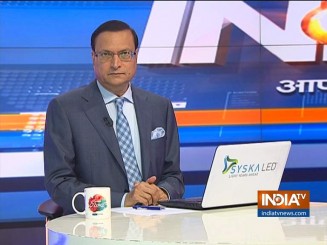 Maharashtra will have assembly polls next month, along with Haryana and Jharkhand, and all the major and regional parties are gearing up for the fight. Prime Minister Narendra Modi addressed a huge election rally in Nashik on Tuesday.
Maharashtra will have assembly polls next month, along with Haryana and Jharkhand, and all the major and regional parties are gearing up for the fight. Prime Minister Narendra Modi addressed a huge election rally in Nashik on Tuesday.
In his speech, Modi praised Chief Minister Devendra Fadnavis’ performance and sought another term for him. Apart from other issues, he focussed on Kashmir and freedom fighter Veer Savarkar.
Modi said, “Earlier we used to raise the slogan ‘Kashmir Hamara Hai (Kashmir is ours), but now our slogan should be “Kashmir ko banana hai (we must build a new Kashmir). The time has come to turn Jammu & Kashmir into a paradise. Already we have lost 42,000 people in Kashmir due to terrorism.”
The PM’s speech makes it quite clear that Kashmir will be at the top in the list of poll issues that will figure in Maharashtra, Haryana and Jharkhand, where the BJP is seeking another term. On Thursday, Modi clearly said that the decision to nullify Article 370 was taken “keeping in view the sentiments of 130 crore Indians”.
Modi said: “A lot of efforts are being made from across the border (read Pakistan) to spread unrest in the valley. The youths, mothers and sisters in Jammu and Kashmir have now made up their mind to come out of the long phase of violence. They want development and jobs.”
Modi mentioned Kashmir because Nationalist Congress Party supremo Sharad Pawar had recently criticized the house arrest of opposition leaders in the valley. Modi said: “I can understand the confusion of the Congress. But Sharad Pawar? I feel bad when an experienced leader like him makes wrong statements for votes. He said he likes the neighbouring country. It seems he finds them better than us, but the world knows where the terror factories lie.”
Modi then touched upon the issue of the great freedom fighter Veer Savarkar, a figure respected by the people of Maharashtra. The PM said: “Maharashtra has given birth to many brave sons, like freedom fighter Veer Savarkar. It was Savarkar who smiled in the face of adversity even when he was being tortured by the British during the freedom struggle. Savarkar was a leader who instilled the pride of nationalism in our youths.”
Modi raised the issue of Savarkar because the Congress party in 2016 had posted a series of tweets calling Savarkar a “traitor” and alleging that he had “begged for mercy from the British”. Savarkar’s grandson Ranjit Savarkar had filed a complaint before a Mumbai court which has now directed the police to question Rahul Gandhi in this matter. Surely, this issue will gain traction as the poll campaign rises to a feverish pitch.
Click Here to Watch Full Video | Get connected on Twitter, Instagram & Facebook
Why SC wants to deliver its Ayodhya verdict in November
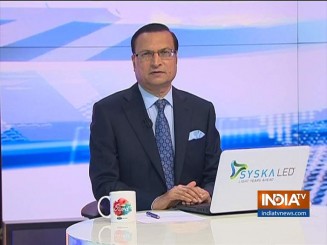 The five-judge Constitution Bench of Supreme Court, headed by Chief Justice Ranjan Gogoi, on Wednesday said that it hopes to conclude hearing in the Ayodhya case by October 18, and the bench would take four weeks to write the judgement.
The five-judge Constitution Bench of Supreme Court, headed by Chief Justice Ranjan Gogoi, on Wednesday said that it hopes to conclude hearing in the Ayodhya case by October 18, and the bench would take four weeks to write the judgement.
The verdict is going to be pronounced on or before November 17, the day Chief Justice Ranjan Gogoi retires. This litigation over the ownership of 2.77 acres of Ramjanmabhoomi-Babri Masjid land in Ayodhya is 70 years old, but the dispute over the land has been lingering on for more than 150 years, both during the British rule and in the post-Indepence period.
As many as 14 appeals were filed in the Supreme Court against the 2010 Allahabad High Court verdict, that was delivered in four civil suits. The High Court in its verdict had said that the disputed 2.77 acres of land be divided equally between three parties – Sunni Waqf Board, Nirmohi Akhara and the representatives of Ram Lalla – the child deity.
The Supreme Court verdict, if given in November, will be a landmark one, because this is one case in which several mediation efforts have failed. The Chief Justice wants to deliver the verdict before he retires, but there are also sceptics who say that fresh petitions may be filed to delay the hearing and verdict, so that the dispute may linger on.
If the apex court is unable to finish hearings by October 18, and if the judges do not get enough time to write their judgements before the retirement of the Chief Justice, then the bench will have to be reconstituted for fresh hearings. This would mean that the case would drag on.
Now that the hearings are in the final stage, the people of India want an end to this vexed dispute, once and for all. The sooner, the better.
Click Here to Watch Full Video | Get connected on Twitter, Instagram & Facebook
Why Modi is a successful Prime Minister
 In my 40 years of public life, I have seen several prime ministers from close quarters, had conversations with them and assessed their work, but I can definitely say that none had the matching vigour and courage that one notices in Narendra Modi.
In my 40 years of public life, I have seen several prime ministers from close quarters, had conversations with them and assessed their work, but I can definitely say that none had the matching vigour and courage that one notices in Narendra Modi.
I have never seen any prime minister who toiled as hard while in office as Narendra Modi. The IAF air strike on Balakot inside Pakistan and revocation of Article 370 were tough decisions that required limitless courage, and yet Modi the PM did it, without batting an eyelid.
Since the day he took over as Prime Minister in May, 2014, Narendra Modi has not taken a single day leave for rest and recreation. He is a man who does not like to waste time on evening parties and dinners. Each minute of his schedule is always linked to a work, a plan or a vision.
Many people think Narendra Modi is a hard task master and does not spare others. But I can say, Modi is a hard task master only for himself. He never compromises with his daily schedule and routine, does yoga exercises daily, his breakfast, lunch and dinner are frugal and always on time, he is very punctual and always prefers to do most of his work within specified timeline.
It is also a fact that Modi is very sensitive and emotional about others. He always stands by those he trusts, but he never tolerates lies and dishonesty. It is because of his sterling character that top industrialists and businessmen now say that there cannot be any wheeling-dealing at the top. The middlemen who used to walk the corridors of power five years ago are now unemployed, some are inside jail and some others are out on bail.
Narendra Modi has shown to the nation how a government can be run, free from corruption and how a government can strike fear in the minds of those who are dishonest and corrupt. Modi has said this clearly that such people will always have to live in fear, of the law.
In a nutshell, I can say that Modi’s critics have failed to read his mind. They cast doubts on his policies and intentions, but, as they say, there is no cure for doubt. This is the reason, why his opponents continued to lose, and Modi wins, over and over again. On behalf of India TV, I offer my best wishes to our Prime Minister on his 69th birthday.
Click Here to Watch Full Video | Get connected on Twitter, Instagram & Facebook
The significance of Trump attending Modi’s event in Houston
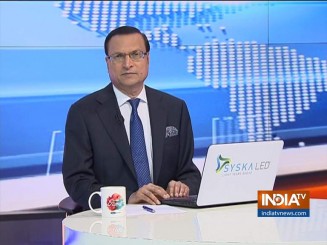 US President Donald Trump will join Prime Minister Narendra Modi at the ‘Howdy Modi!’ mega rally in Houston, Texas on September 22. Both the leaders will be addressing a record crowd of more than 50,000 Indian-Americans at the event.
US President Donald Trump will join Prime Minister Narendra Modi at the ‘Howdy Modi!’ mega rally in Houston, Texas on September 22. Both the leaders will be addressing a record crowd of more than 50,000 Indian-Americans at the event.
The ‘Howdy Modi!’ event will be the first time that a US president will be addressing a gathering of Indian-Americans at one place. On Monday, Modi tweeted: “The special gesture of President Donald Trump to join us in Houston highlights the strength of the relationship and the recognition of the contribution of the Indian community to American society and economy”.
The coming together of President Trump and Prime Minister Modi at a mega rally inside the US signifies the emergence of our PM as one of the top leaders of the world. It also denotes the tremendous amount of respect that the world powers have towards India.
Of course, there are critics in India who are trying to connect Trump joining Modi’s rally to the forthcoming US presidential elections later next year. These Modi baiters say that Trump is more interested in the votes of Indian American citizens.
I want to tell them this is not the first time that elections are being held in the US. There had been elections in the past, and the votes of Indian-Americans were counted by American leaders as vital. But never had a US president shared stage with an Indian prime minister for addressing the Indian diaspora in the US.
This development should be seen as a big achievement for our foreign policy makers. It also marks the emergence of India on the international stage as a country respected by world powers, and of course, the acceptance of Narendra Modi as a world leader respected by his contemporaries.
Click Here to Watch Full Video| Get connected on Twitter, Instagram & Facebook
Why Imran Khan sounds desperate?
 Pakistan Prime Minister Imran Khan addressed a rally in Muzaffarabad, Pak Occupied Kashmir on Friday and in a belligerent tone he asked the crowd “not to cross the Line of Control towards Kashmir valley but wait for his signal” after he completes his visit to the United Nations.
Pakistan Prime Minister Imran Khan addressed a rally in Muzaffarabad, Pak Occupied Kashmir on Friday and in a belligerent tone he asked the crowd “not to cross the Line of Control towards Kashmir valley but wait for his signal” after he completes his visit to the United Nations.
This appears to be a new form of tactic on part of the Pakistani leadership, which is desperate after failing to get support from major world powers on the Kashmir issue. That is why Pakistani leaders, both civilian and military, are talking about war, in various forms. Leading them is their Prime Minister Imran Khan, who, in order to divert attention of his people from domestic economic crisis, is egging them on to march towards Jammu & Kashmir.
Friday’s rally marked the third visit by Imran Khan to POK within a month. Accompanying him were his Home Minister, Defence Minister, Foreign Minister, Railway Minister, and other party minions. Since the crowds at his rallies are few, cricketer Shahid Afridi and Pakistani actors and singers were roped in, and the rally began with catchy film songs to attract the audience.
Imran Khan then railed against India and Prime Minister Modi, and threatened to “retaliate” (eent ka jawaab pathar) if India attacked Pakistan. The Pakistani PM also warned world powers of “grave consequences from the Islamic community” if it continued to ignore the Kashmir issue.
Imran Khan knows it well that Pakistan can never win a conventional war against India. So he changed tack and asked the Pakistani youths to be prepared “to cross the Line of Control”. A war is fought by armies and not civilians, and Imran Khan should be the best person to know this.
The UN General Assembly, an annual affair, is meeting in the last week of September and both Prime Ministers Narendra Modi and Imran Khan are due to address the august gathering. Pakistan foreign minister raised the Kashmir issue at the UN Human Rights Council meeting in Geneva this week, but none of the big world powers supported him.
Pakistan Interior Minister Aijaz Ahmed Shah remarked that the “world is no more listening to Pakistan”. That is why, Imran Khan warned western powers on Friday that they would have to face the consequences if war broke out between India and Pakistan over the Kashmir issue. It clearly reflects the desperation of a failing Pakistani leadership.
It is now amply clear to all that the revocation of Article 370 granting special status to Jammu and Kashmir is an internal matter of India, and India has the sovereign right to amend its Constitution and laws. Pakistan’s argument that it is an old dispute which requires third party mediation, falls flat on this premise.
Imran Khan is trying to divert the attention of his people from the failures of his government in tackling inflation, economic crisis and dwindling foreign reserves. His war mongering may or may not lead to war, but he must be staring at hard facts. The fact is that India has won all the four wars that it has fought with Pakistan since 1948. The sooner the Pakistani leadership realizes this, the better.
Click Here to Watch Full Video| Get connected on Twitter, Instagram & Facebook
Let us all join the noble mission to banish single-use plastics
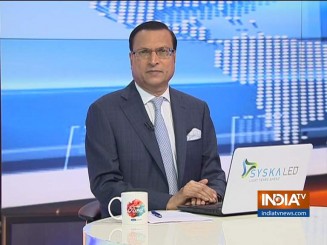 Prime Minister Narendra Modi has given a clarion call to the nation to get rid of single-use plastics by October 2, the 150th birth anniversary of Mahatma Gandhi. At a function in Mathura, Modi met a group of nine women labourers, sat with them with piles of different kinds of plastics and discussed with them how to segregate plastics from garbage.
Prime Minister Narendra Modi has given a clarion call to the nation to get rid of single-use plastics by October 2, the 150th birth anniversary of Mahatma Gandhi. At a function in Mathura, Modi met a group of nine women labourers, sat with them with piles of different kinds of plastics and discussed with them how to segregate plastics from garbage.
I fully support Prime Minister Modi’s noble mission to banish single-use plastics. All of us use plastic products in our daily life, but we never pause to think about the risks they pose to us and our environment.
Time has now come to say goodbye to use of plastics. The government may call for a ban on single-use plastics, but its successful implementation depends on our wholehearted cooperation. We must spread awareness about the risks posed by single-use plastics.
Most of us start our day by using single-use plastics. We first buy milk packed in plastic pouches, carry them in polythene bags, then buy vegetables and fruits from vendors in polythene bags, we also buy drinking water packaged in plastic bottles, purchase potato chips and other eatables packed in plastic, and in offices and homes, drink tea and coffee in plastic cups with plastic covers.
From milk to vegetables to tea and coffee, single-use plastic has become part of our daily routine. We have to get rid of them. Most of these single-use plastics end up in garbage bins and from there, they find their way to huge garbage dumps that encircle our cities. Polythene shopping bags, plastic bottles, straws, cups, plates, food wrappers, gift wraps, disposable coffee cups, plastic spoons, plastic forks, plastic containers, all of them end up in garbage dumps.
The problems arise when these are taken for recycling. Every year, we create 1.40 crore tonnes of plastic garbage, out of which people living in our 60 cities contribute the most.
These single plastics are one of the main causes behind global warming and climate change. Since most of them are non-biodegradable, they damage our soil for centuries to come.
In Delhi, we have three big garbage dump hills, one at Bhalswa Dairy, the other in Ghazipur in the east, and the third at Okhla in the south. There are big plants which treat waste material, but only one-thirteenth of single use plastics, which comes to merely 7 per cent, can be recycled. The rest of the plastics lie deeply embedded in the ground, and over the years, running water from this surface reach our rivers and seas, endangering the fate of our future generations.
You may have seen visuals of huge quantities of polythene bags being taken out from the stomachs of dead cows and other cattle. In a single case in Nagore, Rajasthan, 170 kg of polythene was extracted from the stomachs of a cow and a bullock. Nearly 80 kg polythene was extracted from the cow’s stomach and the remaining 90 kg polythene was found inside the bullock’s stomach.
Plastic waste also ends up on the floor of the seas endangering marine life. In Davao, Phillipines, nearly 40 kg plastic was found from the stomach of a dead whale. A UNESCO report says, at a least one lakh marine animals die every year due to plastic waste. Nearly 2,000 species of fish face extinction due to plastic pollution. Another scientific study says, effects of plastic pollution have been noticed in at least 90 per cent of sea birds.
If single-use plastic is burnt instead of recycling, it releases toxic gases in the air. Single-use plastic that lie on garbage dumps emit methane gas, which can cause climate change. Methane gas is 30 times more toxic than carbon dioxide. Sanitation workers die of methane gas when they enter deep septic tanks.
You may not be knowing it, but it is a fact that single-use plastics find their way to our body. On an average, 50 molecules of plastic waste reach our body through air, food and water. These can cause harmful diseases. Styrofoam is also part of the plastic family. Normally, styrofoam is used to package electronic and other products. This can harm our nervous system, lungs and reproductive organs.
In 2012, the Supreme Court had said that a huge atomic bomb is ticking in the form of plastic waste. A FICCI study says, an average Indian uses a minimum of 11 kg plastic in a year, while an American uses 110 kg a year. Throughout the world, 100 billion plastic bags are manufactured every year. We throw 35 lakh tonnes of plastic bags every year.
In India, we generate 26,000 tonnes of plastic waste daily. This adds up to 95 lakh tonnes a year. Uttar Pradesh, Gujarat, Punjab, MP and Odisha are the five states that consume plastic products heavily. Not only this, 1.5 lakh tonnes of plastic waste enter India from foreign shores every year. A 2017 report by Nature Communication says, 1.1 lakh tonnes of plastic waste is thrown into river Ganga every year.
The question now is: what is the way out? We have to banish single-use plastics from our life. Already, 13 countries including the US, New Zealand, France, Canada, Morocco, Kenya, Zimbabwe, Bangladesh and South Korea, have banned single-use plastics. India is going to impose ban on single-use plastics on October 2. In India, the government has already banned production, import, storage, transport and sale of plastics of less than 50 microns, but this order is being flouted with impunity.
After the Prime Minister’s appeal, campaign against single-use plastics has begun in several cities and states. People have started using metal and glass bottles instead of plastic. Use of plastic water bottles has been prohibited in several ministries of central government. Three students of Dr. Ambedkar Institute of Technology in Kanpur have produced eco-friendly plastic by using potato and soap.
Banishing single-use plastics is an uphill task. We consume 1.7 crore tonnes plastic products a year, out of which only 7-10 per cent are used in packaging. The problem lies in replacing plastic packaging with another viable form. The turnover of packaged water industry in India is roughly Rs 30,000 crore and this industry employs seven lakh people. We have to factor in this fact before taking a decision.
It is a hard fact that there is presently no viable substitute to single-use plastics. But the time has now come to say farewell to plastics. There may be initial hiccups, but a plastic-free India is a must for the sake of our future generation and for the sake of our beautiful earth.
Please stay away from plastics. To the maximum extent possible, kindly use cloth or jute bags to replace plastic. Avoid using non-recyclable plastic bottles and plastic straws. These are small suggestions, but if followed scrupulously, it can play a big role.
Secondly, our R&D scientists should put in their best efforts to find a viable product to replace single-use plastics. As part of India TV’s initiative towards a plastic-free India, I assure you, I will show in my ‘Aaj Ki Baat’ program, news reports about scientists who are working hard and will surely attain success. I hope, the government will encourage these scientists. Let us vow not to use plastic and let us also persuade others too. This is, after all, a noble mission.
Click Here to Watch Full Video | Get connected on Twitter, Instagram & Facebook